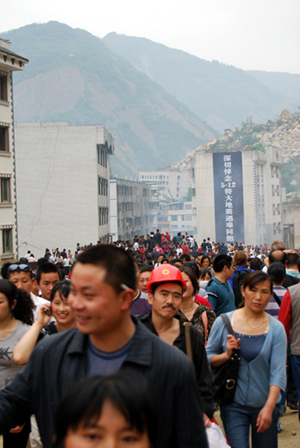|

|
|
Some of the tens of thousands of people who visited the old town of Beichuan on the anniversary of the May 12 earthquake. [John Sexton/China.org.cn] |
By John Sexton
China.org.cn reporter in Beichuan
They came in tens of thousands; the bereaved, the sympathetic, the patriotic and the curious. By 9.00 AM, the road to Beichuan was blocked with buses and trucks of every type, by cars and taxis, and above all, by countless motorcycles, usually carrying three people, and often a family of four. Horns blared incessantly but despite the gridlock there were no frayed tempers.
The multitude had a mixture of reverence and holiday spirit that gave this anniversary trip the character of a medieval religious pilgrimage. People had traveled from all over Sichuan Province, from every part of China, to see the remains of the town that is the symbol of the destruction caused by the May 12 earthquake.
The road leading to the old town was lined with street traders selling chrysanthemums and the paper money that Chinese people burn as an offering to the spirits of the deceased; as well as furs, gruesome looking dried mountain game and other local specialties.
About a hundred meters before the entrance to the old town are the pitiful remains of Beichuan Number One Middle School where around 1,000 students died a year ago. A basketball hoop lying on top of a tangle of concrete slabs and beams is a poignant symbol of the youth who lost their lives that day.
The road snakes down a steep hillside, passing a massive landslide, into the wreckage of the old town. At the roadside and the edges of the ruins, people lit candles, incense sticks and burn paper money and paper copies everyday articles. The previous day I had watched while a young woman burnt a shirt, tie and wristwatch set as an offering to her lost relative. A man of around thirty-five talked intimately with his lost loved one.
Mourners try to get as close as possible to their former homes and the places where their loved ones lost their lives, despite the precariousness of the ruins. Once they find the spot many simply sit in silence. Here and there, elderly men and women rummage around the edges of the ruins to collect plastic bottles to sell for recycling, since life must go on.
In the town center, entire apartment blocks have been knocked askew by massive boulders and slant at crazy angles. In some places the giant rocks seem to have punched holes in buildings and rolled into the peaceful lake that sits at the center of Beichuan’s valley. Some buildings have simply collapsed into piles of masonry. Under the boulders, the collapsed apartment blocks and schools, there are thousands of unrecoverable bodies. Beichuan is a mass grave.
Here and there one can glimpse interiors. I peered into a living room with undamaged light fittings, a calendar hanging on the back wall, and a picture of a lake surrounded by forests. A little further on one can see the shelves and checkout counters of a supermarket. The Beichuan Grand Hotel still stands by the lakeside but the columns on one side have been snapped like chopsticks. Up the hill towards the town center is a ruined police station. The devastation, the crowds, the sense of ordinary lives abruptly canceled out, seemed to turn Beichuan on May 12 into a modern Pompei.
Every few minutes the sound of firecrackers echoing across the lake and around the valley intensifies the silence.
(China.org.cn May 12, 2009)